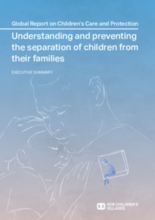Researching the factors contributing to the separation of children from their families is particularly challenging due to the overrepresentation of higher-income countries in existing literature and the influence of both the objective capacity and subjective perspectives of those recording the reasons for children’s admission to alternative care. This makes it difficult to consistently understand and document the phenomenon.
To address this challenge, the report integrates key findings from a systematic literature review of global research, and it introduces new data from country studies across various income levels, filling gaps in current research to provide a more comprehensive understanding of the factors contributing to family separation and ways to prevent it. By including countries from low-, middle-, and high-income contexts, the research provides insights that reflect a broad range of experiences, helping to expand understanding of family separation across diverse settings. The research combines information from existing studies on the circumstances in which children are separated from their families with findings on the specific reasons for separation within selected national child protection systems, particularly those leading to placements in alternative care.

